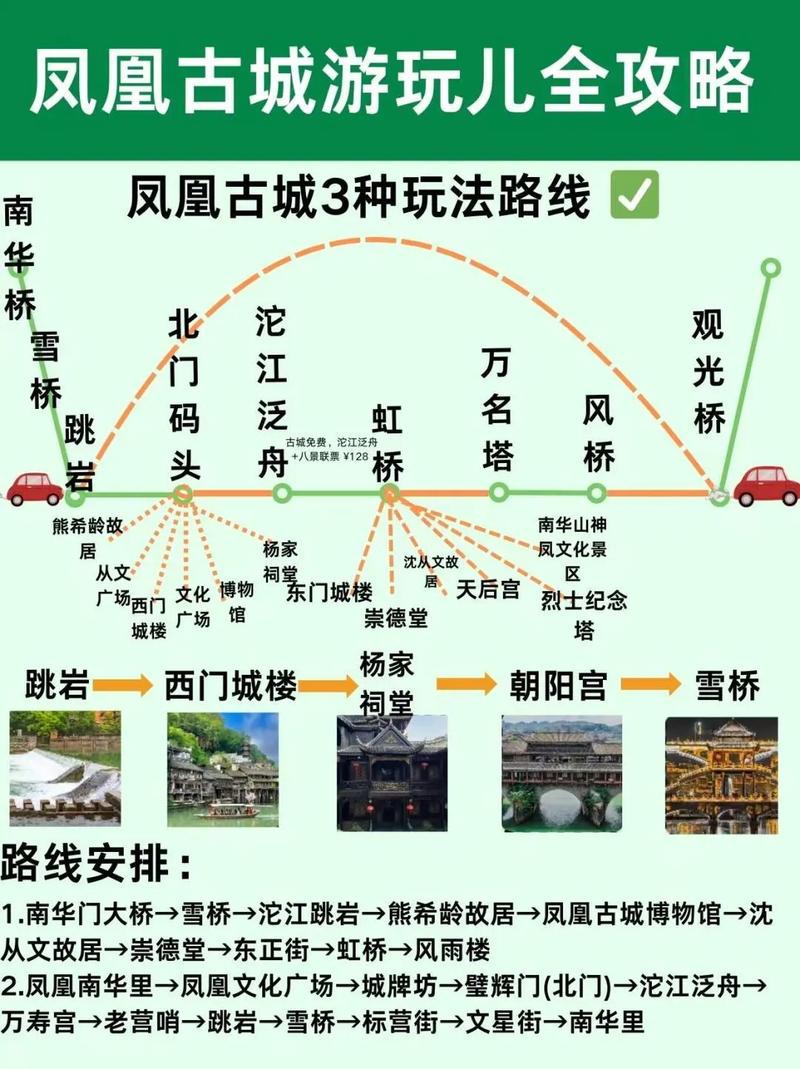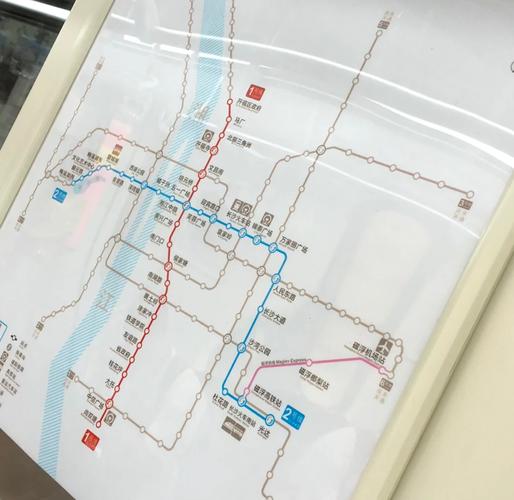广州到凤凰古城自驾游全攻略
凤凰古城,一个被誉为“中国最美的小城”的地方,以其清秀的沱江、古朴的吊脚楼、浓郁的苗族风情和深厚的文化底蕴吸引着无数游人,从广州自驾前往,是一场穿越繁华都市,奔向诗与远方的精彩旅程。

(图片来源网络,侵删)
行前准备
- 车辆检查:长途驾驶,安全第一,出发前务必检查车况,包括轮胎(胎压、磨损)、刹车、机油、冷却液、灯光等。
- 证件准备:身份证、驾驶证、行驶证、保险单(特别是交强险和商业险)。
- 物品准备:
- 衣物:湘西多山,气候多变,建议带上薄外套、冲锋衣,以备不时之需,舒适的鞋子至关重要,因为古城内需要大量步行。
- 药品:晕车药、肠胃药、创可贴、感冒药等个人常用药。
- 其他:充电宝、相机、少量现金(部分小店可能无法线上支付)、雨具。
- 预订:凤凰古城的住宿和节假日(特别是周末、黄金周)的停车位非常紧张,建议提前预订。
路线规划与时间
从广州到凤凰古城,全程约 850-900公里,主要走 许广高速(G0421) 和 杭瑞高速(G56)。
推荐路线:
广州 → 许广高速(G0421) → 韶山/娄底/怀化 → 杭瑞高速(G56) → 凤凰古城
- 广州出发:从广州市区上 华南快速 或 京港澳高速,转入 许广高速(G0421) 往北行驶。
- 途经主要城市:郴州、衡阳、株洲、湘潭、娄底、邵阳、怀化。
- 关键节点:在 怀化市 转 杭瑞高速(G56),向西行驶约1.5小时即可到达凤凰古城出口。
时间安排:
-
2天1晚(最推荐)
- Day 1:广州 → 怀化(约6-7小时),中午或下午抵达怀化,入住酒店后可在市区品尝当地美食,如 怀化鸭、 血粑鸭 等,晚上早点休息。
- Day 2:怀化 → 凤凰古城(约1.5小时),睡到自然醒,上午出发前往凤凰,下午开始游览古城,晚上欣赏沱江夜景。
-
3天2晚(更舒适)
 (图片来源网络,侵删)
(图片来源网络,侵删)- Day 1:广州 → 韶山/娄底(约4-5小时),下午抵达后,可游览 韶山冲(毛泽东同志故居),感受红色文化,晚上入住韶山或娄底。
- Day 2:韶山/娄底 → 凤凰古城(约4-5小时),上午出发,中午抵达凤凰,下午悠闲逛古城,晚上看夜景。
- Day 3:凤凰古城 → 广州(约9-10小时),上午可以再去沱江边走走,购买些特产,中午后启程返回广州,晚上或深夜抵达。
费用预算(按2人计算)
- 油费:往返约1800公里,按百公里8升油耗、8元/升计算,约 1150元。
- 过路费:往返约 800元。
- 住宿:凤凰古城的住宿丰俭由人。
- 经济型:200-400元/晚。
- 舒适型(江景房):500-1000元/晚。
- 豪华型:1000元以上/晚。
- 预算:按2晚舒适型计算,约 1200元。
- 门票:凤凰古城景区门票 148元/人(包含多个景点),如果住在古城内,可以凭身份证进入古城,但进入部分收费景点仍需购票,如果只逛古城,不进收费景点,则无需购买。
- 餐饮:古城内消费适中,人均每天约 100-150元。
- 其他:停车费、小吃、纪念品等,约 300元。
- 总计:人均约 2000 - 3000元(丰俭由人)。
凤凰古城深度游攻略
住宿推荐
- 沱江边吊脚楼:体验感最佳,推窗见景,推荐 回龙阁、 沱江泛舟 附近的江景客栈,缺点是节假日价格高且可能有些吵闹。
- 老营城附近:相对安静,离核心景点近,性价比高。
- 虹桥附近:交通和购物便利,美食集中。
必游景点
- 沱江泛舟:凤凰的灵魂,建议在 傍晚时分 乘坐,可以欣赏两岸的灯火和古城夜景,感受“夜泊凤凰”的诗意。
- 虹桥:连接古城两岸的标志性建筑,也是观景和拍照的绝佳位置,白天可以俯瞰沱江和两岸吊脚楼,晚上则灯火辉煌。
- 东门城楼:古城的正门,是凤凰的象征,可以登上城楼,俯瞰整个古城和远处的青山。
- 沈从文故居:了解文学巨匠沈从文生平的地方,也是古城的文化地标。
- 杨家祠堂:典型的明清家族建筑,展现了古代湘西的宗族文化。
- 沱江跳岩:由两个石墩组成的简易石桥,是体验湘西风情的有趣方式,拍照也很出片。
美食推荐
- 血粑鸭:凤凰的头牌菜,鸭肉鲜嫩,血粑香糯,味道浓郁。
- 苗家酸汤鱼:用本地特有的番茄和辣椒熬制,酸辣开胃,非常鲜美。
- 姜糖:古城内随处可见的手工姜糖,可以现场观看制作过程,口感香甜微辣。
- 苗家社饭:用糯米、野菜和腊肉蒸制而成,清香扑鼻。
- 凉面/凉粉:夏天古城解暑的绝佳小吃,酸辣可口。
- 炒螺丝:沱江里的新鲜小螺丝,配以紫苏叶爆炒,是下酒好菜。
体验活动
- 穿苗服拍照:在古城内有很多租借苗族服饰的店铺,可以化上精致的苗族妆容,在古城的各个角落拍下美美的照片。
- 听一场酒吧民谣:古城的酒吧文化盛行,很多酒吧都有驻唱歌手,民谣歌声在古城的夜晚回荡,别有一番风味。
- 逛夜市:虹桥下的夜市非常热闹,可以买到各种手工艺品、银饰和当地特产。
注意事项
- 驾驶安全:
- 广州到凤凰多为高速,但进入湘西后,山路多,弯道急,务必减速慢行,注意对向来车。
- 避免疲劳驾驶,建议每2小时进入服务区休息一次。
- 关注天气,雨雪天气路面湿滑,更要小心驾驶。
- 停车问题:
- 到达凤凰古城后,车不能直接开进古城核心区,需要停放在指定的外围停车场。
- 主要停车场有:沱江风光带停车场、虹桥停车场、新田垅停车场等,停车费约10-20元/天。
- 从停车场到古城核心区需要步行10-15分钟,或者乘坐当地的电瓶车(约5元/人)。
- 消费陷阱:
- 在古城内购物或消费时,先问清楚价格,特别是银饰、苗服租赁等。
- 拍照前,与摄影师或穿苗服的店铺老板确认好价格,避免事后纠纷。
- 尊重当地文化:
- 凤凰是苗族聚居区,请尊重当地的风俗习惯。
- 不要随意进入当地居民的家中,拍照前最好征得对方同意。
- 最佳旅游时间:
- 春季(3-5月)和秋季(9-11月)是最佳季节,气候宜人,风景优美。
- 避开“五一”、“十一”等黄金周,人山人海,体验感会大打折扣。

(图片来源网络,侵删)




